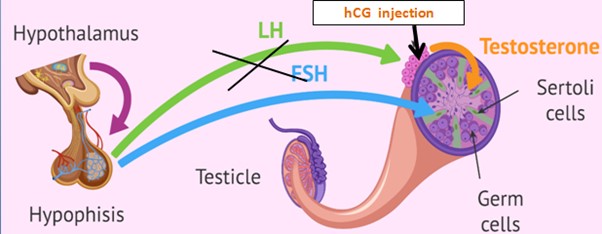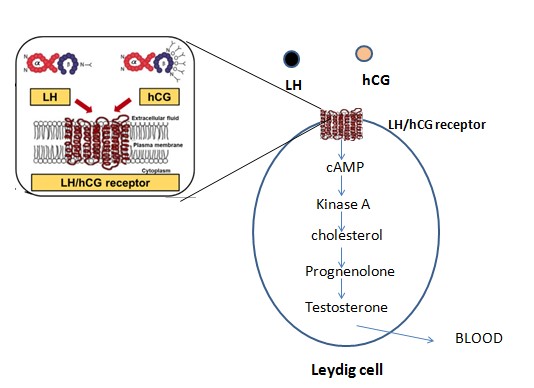Written by
Science & Humans
Written by
Science & Humans

Medically approved by
Maria Jacob
Last updated
9/22/2024 5:30:00 AM
Share
Human chorionic gonadotropin hormone, or hCG, is primarily related to pregnancy. When it is discussed, it frequently pulls up images of expectant moms and pregnancy tests. It is a hormone that is largely produced by the placenta during pregnancy and plays an important role in fetal development and supporting pregnancy as a whole. But did you know that hCG injections have proven to be an unexpected boon for men's health? Yes, the applications of hCG extend far beyond pregnancy. Aside from its role in pregnancy maintenance, hCG has therapeutic potential for a range of medical issues in male patients, including testosterone regulation and fertility enhancement. The adaptability of this hormone emphasizes its importance in both pregnancy and men's healthcare.
Besides pregnancy, hCG has a role to play in male health also. In males, the anterior pituitary gland produces LH (Luteinizing hormone) which directs the Leydig cells in the testicles to produce male hormone testosterone. In cases of testosterone deficiency, hCG injections are used as a replacement therapy. hCG acts similarly as the LH and boosts testosterone production. Hence, human gonadotropin hormone injections can be utilized to restore testosterone levels in males with drastically diminished intratesticular testosterone levels due to low LH (1). Let's look at some of the conditions that hCG injections can help with and how they work:
Medically, hypogonadism refers to a decrease in functional activity of the gonads. The male gonads or testes produce sexual hormones such as testosterone, estrogen, progesterone, and gametes or sperm. A lack of testosterone, a critical hormone for sexual, cognitive, and physical function and growth, characterizes male hypogonadism. Low testosterone levels due to hypothalamic, pituitary, or testicular disorders are known to cause infertility, muscular atrophy, and other complications. Treatment with testosterone (also known as testosterone replacement therapy, TRT) as a therapy for the illness is associated with the hormone's peaks and troughs, resulting in swings in symptom alleviation, and has been discontinued globally (1). In hypogonadism, hCG injections is preferred as a method of hormone replacement therapy (HRT) over TRT to stimulate the testes to produce more testosterone and sperms, hence preserving fertility, reducing testicular atrophy, and improving sexual desire (2-4).
Testosterone plays a very important role in overall men’s health. Low testosterone levels in males can have a negative impact on emotional and cognitive well-being. Low testosterone is commonly related with mood swings, irritation, and even sadness. In cases where the pituitary gland produces relatively little LH, hCG injections are given; this hCG mimics the hormone luteinizing hormone (LH). hCG attaches to LH receptors in the testes when administered, causing them to release more testosterone. In this way hCG injections may improve mood and cognitive performance by increasing testosterone production, leading in better mental clarity, motivation, and an overall sense of well-being (5).

Male adolescent boys who experience delayed or missing puberty may be isolated cases or genetically connected. When combined with FSH (Follicle Stimulating Hormone), hCG has shown promising results in initiating puberty, increasing testicular volume, and boosting spermatogenesis in teenage males with hypogonadism (6). This combo therapy not only assists these young people in developing the physical changes associated with puberty, but it also significantly improves their overall self-esteem and quality of life, ensuring a more confident passage into adulthood.
Micropenis, or extremely small penis, is one of the characteristics feature of hypogonadism in young males. Kim and colleagues found that hCG therapy can increase penile length and testicular volume while also boosting testosterone levels (7).
For couples attempting to conceive, infertility can be a truly upsetting situation. While it is commonly connected with feminine causes, men can also experience fertility issues. In this sense, hCG injections provide a ray of hope. Male infertility is sometimes caused by hormonal abnormalities or an inadequate sperm count and/or generation. hCG can drastically increase sperm production and motility in the testes, making it a valuable component of assisted reproductive technologies such as intrauterine insemination (IUI) and in vitro fertilization (IVF) (4), providing a renewed hope for childless couples on their journey to parenthood.
Men take anabolic androgenic steroids (AAS) to improve athletic performance, sexual function, overall well-being, and cosmetic appearance. Men with a history of ASS usage for more than a year might have their natural testosterone production suppressed. When these patients stop using anabolic steroids, human chorionic gonadotropin injections can be given to help restore testosterone levels and other negative effects (8).
Human chorionic gonadotropin (HCG) is a hormone that is analogous to luteinizing hormone (LH) but does not increase testosterone levels directly. Because their beta sub-units are 80% structurally similar, these glycoprotein hormones bind to the same receptor and so have the same mode of action. In the testes, hCG functions similarly to LH by connecting to the same receptors and encouraging the Leydig cells to produce more testosterone. hCG hormones interact with receptors on the outer surface of cell membranes, activating 2nd messenger systems like cAMP, which in turn activates protein kinase, resulting in phosphorylation of certain proteins, which leads to testosterone generation from cholesterol.

When hCG injections are taken incorrectly or in excess, they can cause a variety of adverse effects in men. The following are some possible side effects:
These side effects can vary from person to person depending on individual health conditions, dosage, and duration of use. hCG usage should be under the guidance and supervision of a healthcare professional to minimize potential risks and side effects.
Although the answer to this question is “Yes”, it is controversial. hCG treatment has been linked to weight loss, particularly when used with a very low-calorie diet. In the 1950s, Dr. Albert Simeons, a British endocrinologist, popularized the use of hCG for weight loss. Small doses of hCG, along with a rigorous, very low-calorie diet (typically around 500 calories per day), he argued, could help with weight loss by targeting stored fat. This diet regimen is popularly known as “hCG diet” in weight loss market.
hCG was thought to help reduce hunger and allow the body to use fat stores for energy while preserving muscle mass. However, the efficiency of hCG in weight loss is a source of debate.
While some people have experienced success with hCG when combined with an extremely low-calorie diet, research on its efficacy has produced conflicting results. Some research suggests that any weight reduction on an hCG diet is due to the extremely low-calorie intake rather than the hormone itself. The FDA has not approved hCG for weight loss, and any severe diet or weight loss program should be approached with caution and under medical supervision.
Furthermore, there are severe long term side effects associated with hCG diet plan, such as fatigue, vitamin deficits, gallstone formation, and metabolic slowness. Before using hCG or any radical weight loss regimen, it is critical to seek specific guidance from a healthcare practitioner to guarantee safety and effectiveness. (9).
When administered as prescribed for specific medical conditions under the guidance of a healthcare expert, HCG is considered safe. HCG is typically regarded safe when administered in controlled medical settings, such as fertility treatments or to correct specific hormonal imbalances. However, due to possible risks, using HCG for weight loss, particularly when paired with a very low-calorie diet, has generated concerns and its safety becomes debatable.
It's important to note that the FDA has not approved HCG for weight loss. Any weight loss associated with HCG is likely due to the extremely low-calorie diet rather than the hormone itself. Before considering hCG for any purpose, it's recommended to consult with S & H’s online consultation to understand the potential risks, side effects, and appropriateness of its use for your specific situation. Safety and evidence-based approaches should be taken into consideration when opting for any treatment or supplement.
hCG, while best known for its role in pregnancy, has an array of applications for male patients with various health conditions. Whether it's managing hypogonadism, assisting in fertility treatment, or addressing certain pediatric concerns, hCG therapy, when used judiciously under the guidance of healthcare professionals, offers potential benefits. The side effects of hCG treatment are minimal in these cases. However, its use for non-medical purposes such as weight loss remains combative and therefore should be judiciously decided under the supervision of a healthcare practitioner or a professional dietician. As with any medical treatment, it is crucial to consult with a healthcare provider to determine the suitability of hCG therapy for individual cases.
hCG (Human Chorionic Gonadotropin) is a hormone that mimics Luteinizing Hormone (LH), stimulating the testes to produce testosterone and sperm, making it beneficial for fertility and hormone balance.
hCG injections help with testosterone production, fertility improvement, muscle growth, fat loss, and testicular health by preventing shrinkage caused by testosterone replacement therapy (TRT).
Yes, hCG is commonly used with TRT to maintain testicular function and natural testosterone production, reducing side effects like testicular shrinkage and infertility.
When used under medical supervision, hCG is generally safe for long-term use. However, excessive doses may cause side effects like acne, mood swings, or water retention, so dosage regulation is crucial.
Diagnosis typically involves blood or urine tests to measure hormone levels. In some cases, imaging studies like X-rays or MRIs may be used to detect abnormalities in glands that produce hormones.
Treatment options vary depending on the specific imbalance and may include:
References
|